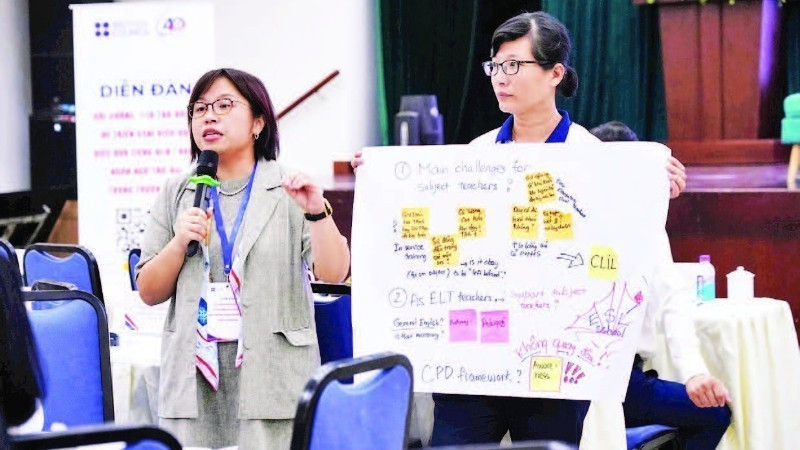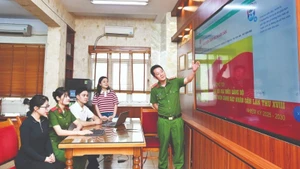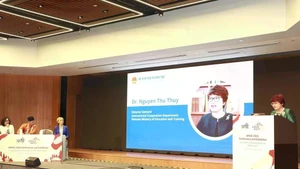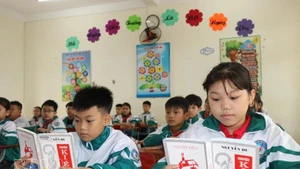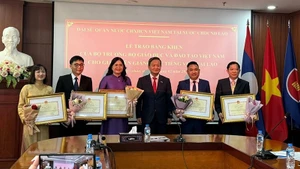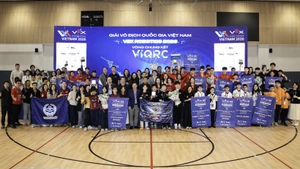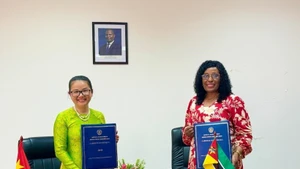Nguyen Thi Mai Huu, Head of the National Foreign Language Project Management Board, said that on December 22, 2017, the Prime Minister approved the adjustment and supplementation of the Project on Teaching and Learning Foreign Languages in the National Education System for the 2017–2025 period.
Based on this approval, the Ministry of Education and Training (MoET) issued several important programmes, such as the English familiarisation programme for kindergarten children, the pilot 10-year English language curriculum for general education, and the 2018 general education curriculum for all foreign languages. As a result, foreign language teaching and learning activities have been unified and expanded nationwide.
Before 2018, preschool children had not officially been introduced to English, pupils in Grades 1 and 2 had not studied any foreign language, and the proportion of pupils from Grades 3 to 12 following the new curriculum was below 36%. Now, 28.5% of kindergarten children are familiarised with English, and nearly 100% of pupils from primary to upper-secondary levels study a foreign language under the 2018 General Education Curriculum.
Notably, many localities have introduced languages other than English. These figures reflect a clear change in awareness as well as strong efforts in implementing the project in practice.
Beyond general education, almost all higher education institutions — including those under the army and the police — have established roadmaps for applying foreign language proficiency standards based on Viet Nam’s six-level foreign language proficiency framework.
The expansion of advanced and internationally affiliated training programmes conducted in foreign languages has significantly promoted the use of foreign languages in teaching and learning, helping both students and lecturers to enhance their proficiency.
Currently, 98% of English lecturers at colleges and universities under the MoET have achieved level 5 or higher on the national framework — a substantial increase compared with previous years. At the same time, the movement to learn foreign languages among students has spread widely through various clubs, extracurricular activities and learning playgrounds, which help them practise communication skills and gain confidence in integration.
Over eight years of implementation, the project has contributed to renewing the teaching and learning of foreign languages — from curricula, content and teaching methods to assessment forms — in line with modern global trends. The foreign language proficiency of students, intellectuals and workers has improved remarkably, meeting the demands of study, research, international exchange and participation in the labour market.
The number of candidates exempted from foreign language tests in the national upper-secondary graduation examination due to possessing international certificates such as IELTS, TOEFL or TOEIC has steadily increased, from 28,620 candidates in 2021 to 67,000 in 2024.
From practical experience in the field, Nguyen Bao Quoc, Deputy Director of the Ho Chi Minh City Department of Education and Training, noted that although the city had introduced foreign languages into schools as early as 1998, it was only after the implementation of the project that teaching and learning became more systematic and comprehensive, oriented towards specific goals.
Schools have boldly adopted various models such as teaching English from Grade 1, offering supplementary English, English for Mathematics and Science for primary pupils, and expanding to other languages like Japanese and Korean. This demonstrates the adaptability and proactive role of localities in implementing the project.
Under the project, Ha Noi National University of Education has implemented seven training programmes for teachers of subjects taught in English, including Mathematics, Physics, Chemistry, Biology, Informatics, Primary Education–English and Early Childhood Education–English. Each year, around 250 students graduate from these programmes, most of whom reach level 4 out of 6 in foreign language proficiency and gain employment in their respective fields.
In teacher training, the university has collaborated with northern provinces and cities to provide foreign language training for nearly 1,000 teachers and pedagogical skills training for almost 4,000 teachers. These results have been highly appreciated by localities, especially in the implementation of the 2018 General Education Curriculum.
In the coming period, Ha Noi National University of Education will focus on three key pillars: applying advanced technology, particularly artificial intelligence (AI), in teaching and learning English and other subjects in English, linked with personalised digital learning platforms; developing the quantity and quality of foreign language lecturers in parallel with appropriate incentive policies; and innovating assessment methods with standardised question banks and technology application to ensure objectivity and accuracy.
The university aims to expand the training of teachers for subjects taught in English, build model schools where English is used as a second language, and standardise graduation outcomes in line with international integration requirements.
According to Standing Deputy Minister of Education and Training Pham Ngoc Thuong, in the current trend of global integration, training and nurturing Vietnamese students and citizens to become global citizens is an essential requirement. The establishment, promulgation and implementation of the Project on Teaching and Learning Foreign Languages in the National Education System have met this demand. Over the years, teachers from both public and non-public sectors, as well as instructors at foreign language centres and students, have made great efforts to achieve the project’s goals, contributing to its success.
Deputy Minister Pham Ngoc Thuong also emphasised that foreign language teaching and learning play a crucial role — both as an intrinsic necessity and as a social demand and development trend. Never before have education in general and foreign language education in particular had so many favourable conditions, yet also faced numerous challenges as at present.
Given the population scale and regional diversity, the first task is to raise social awareness and perception of the importance of learning foreign languages. Based on that foundation, the National Foreign Language Project Management Board should make recommendations for effectively applying lessons learned, promoting the project’s value, and developing a more practical and efficient implementation roadmap for the next phase.
